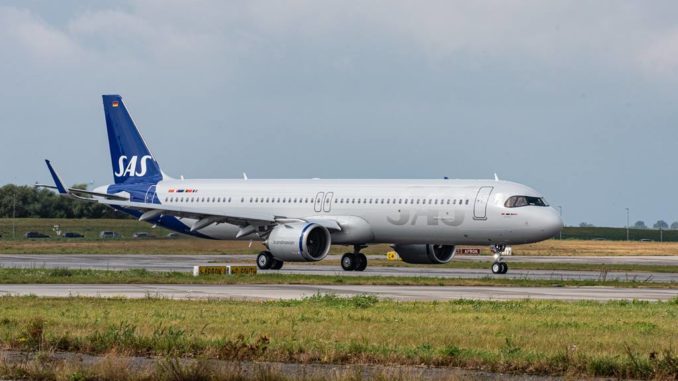
Scandinavian carrier SAS has taken delivery of its first of three Airbus A321LR on lease from Air Lease Corporation becoming the newest operator of the most efficient long-haul single aisle aircraft.
The A321LR is powered by CFM Leap-1A engines.
The delivery flight from Airbus Hamburg to its home base in Copenhagen uses a 10 percent sustainable jet fuel blend. The initiative is part of SAS’s commitment to reducing its carbon footprint and Airbus’ objective to contributing to the aviation sector’s ambitious decarbonisation targets. Airbus is the first aircraft manufacturer offering customers the option of receiving new jetliners with sustainable fuel. Such delivery flights have been available since 2016.
SAS’s A321 features a modern and highly comfortable three-class cabin layout with 157 seats (22 “SAS Business” class, 12 “SAS Plus” class and 123 “SAS Go” class seats). The airline plans to deploy the aircraft from the Nordic countries on transatlantic routes.
The A321LR, a member of the A320neo Family, delivers 30 percent fuel savings and nearly 50 percent reduction in noise footprint compared to previous generation competitor aircraft. With a range of up to 4,000nm (7,400km) the A321LR is the unrivalled long-range route opener, featuring true transatlantic capability and premium wide-body comfort in a single aisle aircraft cabin.
The airline operates an Airbus fleet of 76 aircraft comprising 63 A320 Family, 9 A330 Family aircraft, and four new generation aircraft A350 XWB.
At the end of September 2020, the A320neo Family had received 7,450 firm orders from over 110 customers worldwide.
About the fuel
The fuel for SAS’s A321LR aircraft delivered from Hamburg was supplied by Air bp and produced by Neste from used cooking oil. The fuel is certified compliant with the sustainability requirements of the European Union Renewable Energy Directive through the International Sustainability & Carbon Certification. LCA evaluation by RSB (Roundtable on Sustainable Biomaterials) allows to affirm that over 80% of CO2 emission abatement per each metric ton of substituted fossil fuel is achieved.
Source: Airbus

Be the first to comment